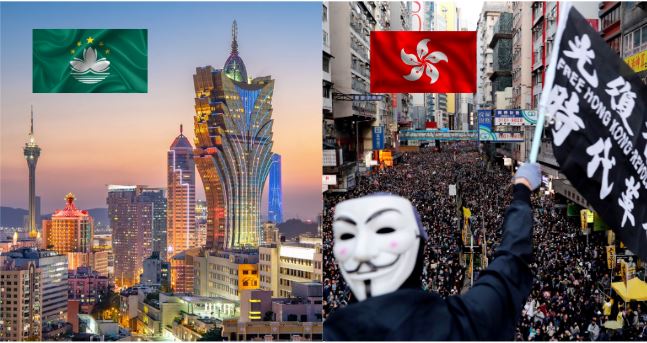The fresh round of pro-democracy protests in Hong Kong has shook the Chinese Communist Party as they battle to quell the uprising and strip the region of its autonomy. However, Hong Kong is not the only special administrative region with “One country, two systems” in place. Just 65 kilometres away from Hong Kong, lies the tiny Macau which also has the “One country, two systems” in place and is one of the most prosperous regions in the world. However, Macau is starkly different as it is decisively pro-Beijing and is willingly allowing the CCP to strip away its autonomy bit by bit unlike, Hong Kong. As Hong Kong erupts again, it will be not be far-fetched to say that a domino effect could trigger a secessionist movement in Macau, the moment it gets a leader like Tsai-Ing Wen.
While Hong Kong was an erstwhile British territory which was handed over to China in 1997, Macau was a Portuguese territory which was handed back to China in 1999 under the “One country, two systems”. This principle grants autonomy to Hong Kong and Macau with the Chinese Communist Party working at a break neck speed to strip the regions of their autonomy. While Hong Kong has always been problematic for the CCP and resists any attempts which tightens Beijing’s grip over the city, Macau wilfully submits itself to the CCP.
Just like Hong Kong, the people of Macau don’t elect its chief executive. The Chief Executive is elected by a Beijing backed 400 member panel who then acts as a loyal lapdog of the CCP. Macau which measures just 31 square kilometres and is home to little over 600,000 people records the third highest GDP per capita in the world.
The economically prosperous region is backed by the CCP as a model region which willingly submitted itself to Beijing and is now reaping the rewards of the same. Hong Kongers don’t care for economic prosperity, they value their freedom the most whereas Macau couldn’t care less for their rapidly deteriorating autonomy.
Hong Kongers are protesting against the controversial national security legislation. Through this legislation, Beijing plans to stop mass protests by banning acts of treason, secession and subversion which would effectively signal the end of the “one country, two systems” principle which China had promised to the UK when it took over the reigns of Hong Kong in 1997 and pledged to keep the city semi-autonomous until 2047.
Previous attempts to introduce the legislation in 2003 was met with protests and was subsequently withdrawn. However, Macau willingly introduced this law in 2009. Such is the influence of Beijing in Macau that only local judges of Chinese nationality are allowed cases pertaining to hear national security.
“This is not something that can be copied in Hong Kong, given that many Hong Kong judges are from Britain. It would also trigger another round of social unrest as Hong Kong people treasure the rule of law and freedom more than Macau people do,” said Eilo Yu Wing-yat, a Macau based political scientist.
Macau’s economy entirely relies on tourism and gaming as gambling is one of the foremost contributors to its economy. An indication of just how rich Macau is can be seen from the fact that in 2018, the Macau government handed out approximately $1,246 to its permanent residents as a part of its wealth sharing programme.
Such mind boggling statistics, has made Macau as the perfect model for the CCP to market what happens when a region completely subjects itself to Beijing. There is a reason why there is hardly any pro-democracy movement in Macau. Almost half of Macau’s present day residents are immigrants from the mainland, hence the pro-China tilt and an absence of any dissent whatsoever.
However, there is a cause for concern for China in Macau if the US tries to interfere. Macau has seen a huge influx of American gaming industries and its economy heavily relies on its gaming industry. In its bid to punish China for its sins, the US might step on Macau’s jugular vein by threatening to pull out American companies from the region and spark a secessionist movement on the lines of Hong Kong.
While the Hong Kong protests had no impact in Macau, there were sporadic protests where some people tried to rally behind Hong Kong. Unsurprisingly, the protests were immediately quelled as the Macau administration locked down a square to prevent protesters from assembling and demonstrating their support for the former British colony.
The Chinese judges also rejected an appeal by the protesters to allow a rally to take place. While the majority in Macau don’t want to do anything that would spoil their rich and comfortable lives, the fact that there have been sporadic instances of protests in favour of Hong Kong, is enough for the USA to capitalise in the backdrop of rapidly deteriorating relations between the US and China.
At a time when the CCP is focusing all its energy in Hong Kong, there is a chance that Macau can be swept under the feet of CCP, but for that to happen, it will need American interference and a leader like Tsai Ing-Wen.








